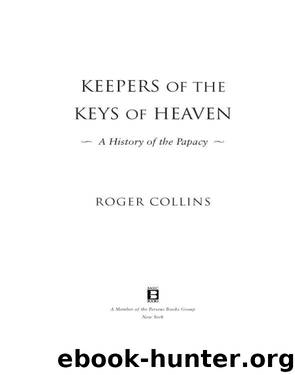Keepers of the Keys of Heaven by Roger Collins

Author:Roger Collins
Language: eng
Format: epub
Publisher: Basic Books
Published: 2010-12-07T16:00:00+00:00
THE AVIGNON POPES
The new pope expected to return the Curia to Rome once the situation in Italy had stabilised. In the papal state the absence of the Curia and the incompetent government of Gascon administrators appointed by Clement V allowed more and more of its towns to fall under the control of local potentates or popular communes. Elsewhere war was endemic between two rival alliances, prolonging the Guelph-Ghibelline or pro- and anti-papal conflicts of the preceding centuries, but by now the issue had much less to do with rival ideologies and was more centred on local power struggles.27 Thus opposing factions could associate themselves with the Guelph or Ghibelline names according to which best served their immediate purposes. The Guelph alliance, which enjoyed papal approval and had existed since 1266, included the Angevin kings of Naples and the dominant faction in the city of Florence. Ranged in opposition to them were the Visconti lords of Milan, the cities of Pisa and Lucca and the Aragonese kings of Sicily. The emperors had taken little interest in Italian affairs in recent decades but generally favoured the Ghibellines.
The emperor Henry VII died suddenly in 1313, soon after he had been excommunicated by Clement V for attempting to depose Robert of Naples, and anti-papalists suggested he had been poisoned by his confessor on the pope’s orders. Clement V, however, used Henry’s death as the opportunity to proclaim that during such imperial vacancies the empire would be directly subject to the pope and that the oath taken by an emperor at his coronation was in itself recognition of papal suzerainty.28 His own death soon after and the subsequent papal two-year sede vacante meant this claim was not tested in practice, but it remained a bone of contention for the future. In the imperial election of 1314 conflict broke out between the two rival claimants, Ludwig of Bavaria and Frederick of Austria. John XXII supported the Austrian duke, only for him to be decisively defeated and captured by the Bavarian at Mühldorf in 1322. John then demanded, in the light of Clement V’s decree, that Ludwig must accept the status of papal vassal to be confirmed as emperor, causing him to support the anti-papal conflicts in Italy and patronise scholars who wrote in defence of imperial authority against that of the pope.
Amongst the best of these was the physician Marsilius of Padua (died before 1343), who ridiculed papal claims in his monumental Defensor Pacis (Defender of the Peace) of 1324, wherein he denied that St. Peter ever held any authority superior to that of the other Apostles or over the Church, and claimed that the emperor had the power to appoint, depose or otherwise punish the pope. John XXII condemned Marsilius in 1327 and was unrelenting in attempts to hunt him down, while in 1343 Clement VI described his work as the worst example of heresy he had ever encountered.29
John XXII created other enemies in his pontificate through his treatment of the Spiritual Franciscans. The conflict
Download
This site does not store any files on its server. We only index and link to content provided by other sites. Please contact the content providers to delete copyright contents if any and email us, we'll remove relevant links or contents immediately.
Resisting Happiness by Matthew Kelly(2881)
The Social Psychology of Inequality by Unknown(2303)
Designing Your Life by Bill Burnett(2259)
Day by Elie Wiesel(2237)
The Giving Tree by Shel Silverstein(1830)
Angels of God: The Bible, the Church and the Heavenly Hosts by Mike Aquilina(1625)
Human Design by Chetan Parkyn(1568)
Augustine: Conversions to Confessions by Robin Lane Fox(1469)
The Supreme Gift by Paulo Coelho(1442)
Hostage to the Devil by Malachi Martin(1391)
7 Secrets of Divine Mercy by Vinny Flynn(1388)
Jesus of Nazareth by Joseph Ratzinger(1374)
The Vatican Pimpernel by Brian Fleming(1338)
Dark Mysteries of the Vatican by H. Paul Jeffers(1338)
Saints & Angels by Doreen Virtue(1310)
St. Thomas Aquinas by G. K. Chesterton(1301)
My Daily Catholic Bible, NABRE by Thigpen Edited by Dr. Paul(1206)
Called to Life by Jacques Philippe(1200)
The Ratline by Philippe Sands(1161)
